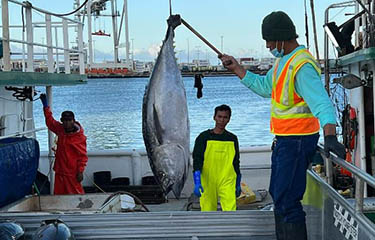The Hawaii Longline Association’s (HLA) swordfish, bigeye, and yellowfin tuna fishery, has achieved Marine Stewardship Council (MSC) certification, making it the first fishery in the U.S. state of Hawaii to achieve MSC certification.
“HLA is proud to receive the certification as it is recognition of the fleet’s stringent management and monitoring regime. We believe our fleet produces the best-quality and highest level of monitored tuna in the world. We look forward to working with MSC, WPRFMC, NMFS and others on the continued and long-term production of sustainably and responsibly harvested fish landed by our fleet,” HLA Executive Director Eric Kingma said.
This achievement followed a 16-month review by third-party assessment body Control Union. The certification covers swordfish (Xiphias gladius), bigeye tuna (Thunnus obesus), and yellowfin tuna (Thunnus albacares) species, as well as the Hawaii shallow-set swordfish longline fishery and Hawaii deep-set tuna longline fishery. HLA is also monitored and follows regulations set by the Western Pacific Regional Fishery Management Council (WPRFMC) and National Marine Fisheries Service (NMFS).
Established by Japanese immigrant fishermen in 1917, HLA now has a fleet of 142 locally owned vessels that have collectively become the largest food producing industry in Hawaii. Furthermore, the state capital, Honolulu, is one of the nation’s most-valuable commercial fishing ports, with landings are worth about USD 125 million (EUR 124.8 million) annually. Since Hawaii’s residents consume nearly twice as much seafood per capita as the rest of the United States, about 80 percent of those landings are consumed locally and nearly 100 percent stay in the United States. About 85 percent of the catch is found in the high seas adjacent to the Hawaii archipelago, while the remainder of the fishing efforts is in the United States’ exclusive economic zone (EEZ).
“MSC certification provides market validation of the sustainability of Hawaii bigeye tuna, yellowfin tuna, and swordfish. Sustainability is the result of strict U.S. fishery management under the WPRFMC and NMFS process," Hawaii Seafood Council Program Manager John Kaneko said. "Hawaii’s longline fishery is now over 100 years old and counting – now that’s what I call sustainable. Local seafood is vital to Hawaii’s diverse ethnic communities. It is essential to island culture, traditions, quality of life, and Hawaii’s growing reputation as a food tourism destination."
The certified fishery is low volume but high value, according to the HLA. The swordfish is caught at night with 100 percent observer coverage and a production rate of 50 to 60 percent of total swordfish and yellowfin tuna landings by the fishery. The deep-set bigeye tuna is fished during the day with an aim of at least 20 percent observer coverage, and consists of 95 percent of the nations’ bigeye tuna landings.
Kaneko said the HLA has previously adopted sustainable management best practices by adopting high levels of observer coverage onboard its vessels in the 1990s and pioneering the use of satellite-monitoring systems in the 1980s. Recently, the HLA voluntarily switched from using wire leaders on gear to monofilament leaders to promote shark conservation. This fishery continues to be recognized in efforts of bycatch mitigation for sharks, seabirds, marine mammals, and sea turtles, Kaneko said.
Additionally, the fleet serves as a vital source of inputs to the the Honolulu Fish Auction, which has been in business for 70 years, Honolulu Fish Auction Manager Mike Groto.
“All of the Hawaii-based longline fleet offloads at one location in Honolulu harbor and the auction is the central hub for the supply of fish throughout Hawaii. Several companies that buy fish through the auction system will be competing for MSC-certified fish and they will distribute that fresh, premium fish to Hawaii and U.S. mainland consumers,” Groto said.
Photo courtesy of Dogan Volkan Korpi/Shutterstock







